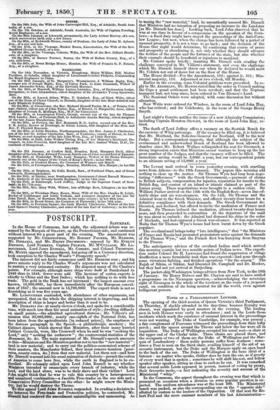POSTSCRIPT.
SATURDAY.
In the House of Commons, last night, the adjourned debate was re- sumed by the Marquis of GRANBY, on the Protectionist side, and continued without interest for a great part of the evening. The amendment was supported by Mr. CHSISTOPHER, Mr. ROBERT PALSIES, MT. HERMES, Mr. DISRA.ELI, and Mr. HENRY DRUMMOND : opposed by Mr. EVELYN DENISON, Lord Nonahrs, Captain PELHAM, Mr. M'CULLAGH, Mr. LA- BOUCHER; Lord JOHN Reams., Mr. COBDEN, and Colonel Thompson. Mr. HUNTS opposed the amendment, but going off in a Currency direction, took exception to Sir Charles Wood's "Prosperity speech." The interest did not fairly commence until Mr. HERMES rose ; and his grave minute reply to Sir Charles Wood's arguments was not calculated to sustain a very animated curiosity. He disputed many of Sir Charles's points. For example, although more ships were 'built at Sunderland in 1849 than in 1848, fewer were sold. The increase of cotton exports is 'chiefly to China and the East Indies; which has nothing to do with free trade. The gold in the Bank has not increased : the' largest amount ever known, 16,000,0001., lay there immediately after the European convul- sion of 1847; the amount now is 15,700,0001. The export trade is not so flourishing as it was five years ago. Mr. LABOUCHERE contended, with abundance of other arguments, not =repeated, that on the whole the shipping interest is improving, and the description of ships is larger and better than it used to be. Mr. Disriami ros at nearly eleven o'clock, and spoke for a considerable time, with much less than his usual animation of style ; dwelling diffusely on small points,—the admitted agricultural distress ; Mr. Villiers's ad- mission that 90,000,0001., nearly one-eighth of the National Debt, has been taken from the agriculturists [in reduced prices] ; the emptiness of the distress paragraph in the Speech—a philanthropic mockery ; the Cabinet dinners, which showed that Ministers, after their many hurried Cabinet Councils, were, like Cromwell when he said he was "seeking the Lord," only "seeking the corkscrew" ; the controversial statistics of the Economist, &c. &c. The main argument of Mr. Disraeli's speech amounts to this—Ministers and Ex-Ministers profess not to tax the "raw material " : land is raw material ; and to carry out the politico-economical scheme of their masters, the Manchester School, they must remove taxation [poor- rates, county-rates, &c.] from that raw material. Let them not—and here Mr. Disraeli warmed into his usual animation of rhetoric—permit the cotton of America to come here free, while the earth in England is to be en- thralled. He solemnly called upon Lord John Russell to say whether Ministers intended to emancipate every branch of industry, while the land, and the land alone, was to be their slave and their victim ? Lord John might think that he was to rule this country by a heterogeneous and unnatural combination—a Jacobin Free-trader on the one side and a Conservative Privy Councillor on the other : he might renew the Minis- try, but he would destroy the Throne. To this appeal Lord Joan RUSSELL responded. In evading a decisive is- sue between the Free-trade and Protection policies, he contended, Mr. Disraeli had rendered the amendment unintelligible and unmeaning. As
to taxing the "raw material," land, he sarcastically assured Mr. Disraeli that Ministers had no intention of proposing an increase in the Land,tax [as Mr. Disraeli has done]. Looking back, Lord John observed that he was at one time in favour of a compromise on the question of the Corn- laws—a fixed duty might have stayed the proceedings of the Anti-Corn- law League ; but now, when the change has been followed by a period of unusual prosperity, it is not a time to go back ; and the decision of the House that night would determine, by continuing that course of peace and prosperity or abandoning it, not only whether they should advance the welfare of the people and the fortunes of the state, but also whether their example should be beneficial or injurious to mankind.
Mr. COBDEN spoke briefly; taunting Mr. Disraeli with evading the challenge conveyed in Mr. Villiers's statement, and even the challenge which Mr. Disraeli himself threw out when he declared he would meet Mr. Cobden not out of doors but on the floor of the House.
The House divided—For the Amendment, 192; against it, 311; Min- isterial majority, 119. Adjourned at two o'clock, till Monday.
Earlier in the evening, some Colonial petitions were presented. In re- ply to Mr. ADDERLEY, Mr. HAWM stated that the order in Council making the Cape a penal settlement had been revoked ; and that the Neptune transport had, not long since, been ordered to Van Diemen's Land.
The Sessional Orders were adopted, with some discussion but without alteration.
New Writs were ordered for Windsor, in the room of Lord John Hay, who has retired ; and for Colchester, in the room of Sir George Henry Smyth.


























 Previous page
Previous page